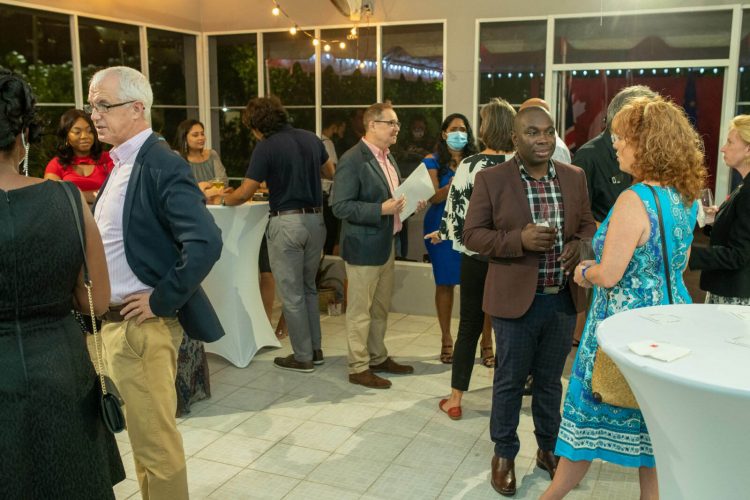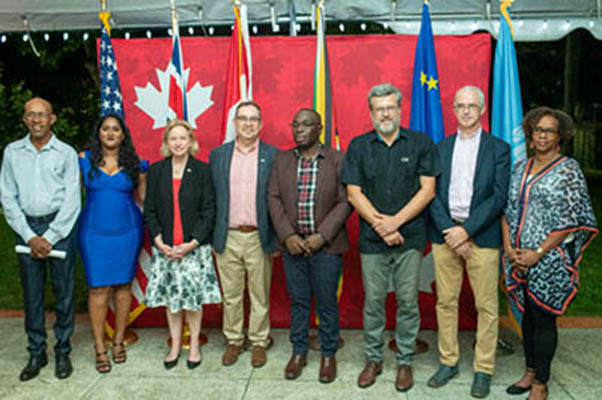Western envoys and the UN on Saturday held a reception for journalists here to mark World Press Freedom Day and lauded their work.
The reception organised by the envoys of the US, the UK, Canada, the EU and the UN System was held at the residence of the Canadian High Commissioner.
European Union, Ambassador Dr. Fernando Ponz Cantó underscored that journalists whether employed by private or public media entities must enjoy independence from being pressured on the direction of their reporting. He said that pressure can come from many quarters and sometimes from the most unexpected direction.
Ponz Cantó made the point as he spoke on the importance of the free press in a developing country. World Press Freedom Day was celebrated under theme “Digital Journalism under Siege” on May 3rd.
“Earlier in my life I wanted to be a journalist…I reflected a lot in that time and one of the things that got me was how would I maintain my independence from the owners of the media, from the big corporations from the groups of pressure from authorities… it is difficult and you do it and you do it every day…” Ponz Canto said as he underscored the importance of the independent journalist.
While applauding the local press corps for their coverage and vigilant watch of the events that unfolded during the 2020 general and regional elections, he stated that the press plays a fundamental role in any democratic society.
“Guyana needs you. It needed you in 2020 when you played a fundamental role and it needs you today. You are the ones ensuring balance of power, transparency, accountability all the good things that a democracy has to have,” he stated.
Pledging the diplomatic community’s support to the local press corps, he said that they will continue to do everything they can to support journalists locally and support the freedom of the media.
He also praised Guyana for initiatives in ensuring the freedom of the press and extended congratulations on the improved position on the Reporters without Borders press freedom index.

Deputy British High Commissioner, Ray Davidson in brief remarks, advised the government to hold extensive consultations when it is updating legislation on media laws and consider the rapid change in digital technology. He pointed out that in some countries changes in media laws have led to consequences.
“…Changes need to ensure laws are fit for purpose, allows for freedom of speech but continues to protect the rights of all…” Davidson said.
Veteran Journalist Denis Chabrol while delivering the feature address called on the government to amend the cybercrime legislation. In his call, he said there are offending aspects in this legislation that can potentially be used against Online News publications.
Noting that in its truest form, journalism, like other professions, is governed by ethics and principles in pursuit of the truth for the public’s interest, he said “… it is fair to conclude that what is regarded by content providers and some content consumers as journalism or truth provided via Social Media means that journalism is under siege”.
Moving forward, he posited that efforts must be made to address the challenges. He called for the investment in an annual media literacy project for journalism practitioners and the public at large to present the opportunity to teach them about what constitutes journalism in contrast to other types of media content.
He added that efforts should be placed on strengthening the University of Guyana’s Centre for Communication Studies to deliver courses in journalism and communication from certificate level through to PhD.
Documentaries
He further recommended that a special fund be established to finance the production of special features and documentaries without any strings attached. These can be co-produced jointly by more than one media house.
US Ambassador Sarah Ann-Lynch said hat journalists must be able to ask tough questions to inform the public and have access to the authorities.
Media freedom, she said is a cornerstone of democratic societies and is essential to the protection of human rights and fundamental freedoms.
Speaking on the same theme of threats against journalists, Davidson said while all threats may not always be physical, they must never be condoned. Stigmatization and harassment, he pointed out are clear attacks against freedom of expression.
He went on to state that a free press illustrates a healthy attitude towards human rights, provides for transparency in government and gives the people their opportunity to express views widely and without intimidation.
“Across the world it is essential that journalists are allowed to investigate and question without fear of intimidation or surveillance”, he stated.
He pointed out that the free press also has responsibilities and should not allow itself to be used to intentionally demean, slander or persecute. It cannot be seen as a free for all to make unfounded accusations. The media must be held to account for what it says, he posited.
Canada’s High Commissioner Mark Berman challenged practitioners to commit to delivering the facts, asking the relevant questions and amplifying the voices of citizens of Guyana.
United Nations Representative, Gillian Smith in her remarks said that the safety of journalists and media workers is critical to protecting human rights and the fundamental right to freedom of expression. She said that the free exercise of journalism doesn’t come without challenges and this has been exacerbated by the rise of new technologies. She said that due diligence and vigilance are absolutely necessary.
Also addressing the gathering was Minister within the Prime Minister’s Office with responsibility for Public Affairs, Kwame McCoy. McCoy in his address said his government believes in media freedom and that this was emphasised by President Irfaan Ali during his remarks at the recent National Press Freedom Conference.
“We cannot and will not support the oppression of any section of media”, the Minister said.
In his remarks he called on the traditional media outlets to embrace new media forms.
“There has to be the emergence of a middle ground that guarantees equal space for equal effort. While we will not dispute the narrow definitions of journalism being applied to this line in the sand, we are cognisant of the indisputable fact that many if not all citizen reporters and social media influencers practice some modicum of the tenets of journalism,” he said.






